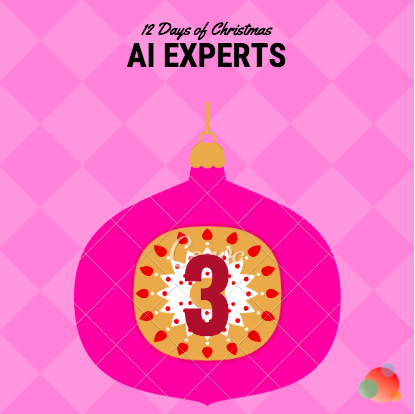 On the third day of Christmas, Spin Sucks gave to you…three AI experts, two PR trends for 2021, and a mi-i-i-indset shift.
On the third day of Christmas, Spin Sucks gave to you…three AI experts, two PR trends for 2021, and a mi-i-i-indset shift.
In the first two articles of this annual series, you were encouraged to expand our way of thinking and given two new strategies communications pros must embrace and master.
Now, I’m sharing three AI resources to help you get a better handle on artificial intelligence.
Many of you already know this, but I’ve been immersing myself in #AIinPR for the past few years.
I even wrote my Master’s thesis on “artificial relationships”, that is, the relationships people have with AI agents and how that affects communications and trust.
(And I don’t mean the kind of AI agent that gets you roles in deepfake videos! #DadJoke—cue sad trombone…)
Many of us are scared/confused/anxious about AI.
And what will happen when it arrives.
But AI isn’t coming.
It’s here and it’s only going to get more pervasive.
Three Wise (and Witty) AI Experts
There’s so much hype around what AI can or will do.
There are also valid concerns about privacy and job loss.
And there’s lots and lots of jargon.
Many of us are faced with a lack of understanding and misconceptions around the different types of AI, so it’s difficult to know where to begin.
And we don’t want to bombard you.
Which is why on this third day of Christmas, we’re presenting three AI experts who can help demystify artificial intelligence.
Or at least get you started on the right learning track.
Marketing, Meet AI
Our first AI expert is someone many of you at Spin Sucks already know: Christopher S. Penn.
Christopher is a rare blend of data scientist and marketer.
You can spot navigating both worlds with ease.
He’s also the co-founder and partner in Trust Insights, a data insights and analytics agency.
And when it comes to AI, marketing, and PR, his book, AI for Marketers: An Introduction and Primer, 2nd edition, is a great place to get started.
The book begins with an explanation of the fundamentals of AI, algorithms, and machine learning—all powered by data—and then delves into practical applications and issues like data bias.
Penn demystifies the landscape: “AI is not magic, it’s math”.
He explains how to incorporate AI and predictive analytics into marketing programs and prepare your organization for the future.
You can subscribe to his weekly newsletter and blog, to keep on top of AI in marketing trends.
Plus, he’s got some of the best disgruntled expressions you’ll ever see.
Oh, the Humanity—Or Lack of It
What if you took an AI and decided to train it to name pies using a natural language processing algorithm?
Here’s a sampling of the results: “Cowdy-Doo Pie”, “Tweezers, Olives and Seafood Apple Pie”, or this treat for the overprogrammed, “Scheduled Coconut Cream Pie”.
Or how about using Open AI’s GPT-3 natural language generator to update Victorian handkerchief flirting signals?
These are just a couple of the comically bizarre and somewhat gruesome names concocted by Janelle Shane’s experiment to show how AI may not be as smart as you think.
Shane has a PhD in electrical engineering and an MA in physics.
And she’s the creator of the AI Weirdness blog, which pretty much delivers on its name.
In her blog, Shane uses AI for mundane but quirky tests like training a neural network to come up with recipes for cookies and finding it recommends horseradish as a key ingredient.
She’s also the author of the recently published You Look Like a Thing and I Love You, a humorous and informative take on AI and what it does and doesn’t do, written in breezy and easy to follow prose.
Uncomplicating the Complexities of AI
If you think AI is confusing and complex, you’re not alone.
This is why our third AI expert, Melanie Mitchell, is particularly apt. Even her title, the Davis Professor of Complexity at Santa Fe Institute indicates she’s a force to be reckoned with when it comes to artificial intelligence.
Over the years, Mitchell has done considerable research into analogies—which play a big role in the way people think and speak—and whether or not computers can successfully make them. This past summer, she ran some tests on GPT-3 and was both impressed by the quality of some of the results and wary of its blunders). You can read more about it in her post on Medium.
Mitchell’s the author of Artificial Intelligence: A Guide for Thinking Humans, which takes you on a historical and philosophical journey into AI, how it started, where we currently are, and where we may be heading.
It’s a thought-provoking and worthwhile read, in part because the science is peppered with Mitchell’s dry sense of humor.
Any AI Experts On Your List?
On this, our third day of Spin Sucks Christmas, we’re offering three AI experts, each of whom has written an AI book (an algorithmic pattern?) and can guide you on your machine-laden adventure.
Do you have any AI experts to add to our list? Feel free to share them in the comments below.
And tune in tomorrow to see what mirth and merriment the fourth day will bring!